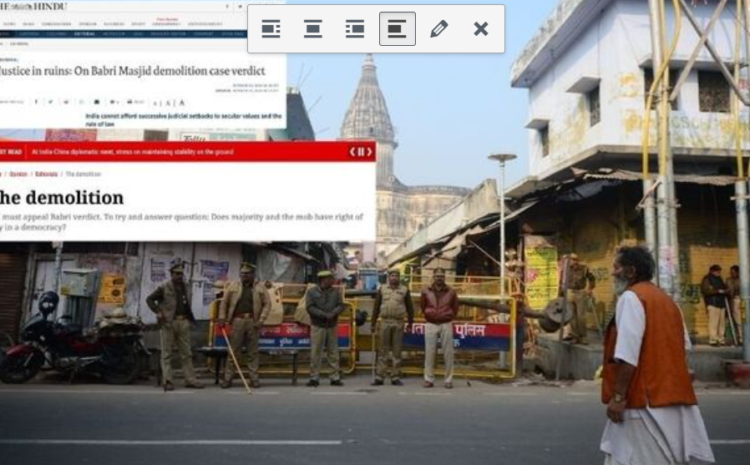
Indian security personnel keep watch on a street in Ayodhya on December 6, 2018.
‘The Indian Express’ said CBI must appeal against the verdict and ‘Business Standard’ said the case is a sorry reflection on India’s premier investigative agency.
A special court on Wednesday acquitted all 32 accused, including BJP leaders LK Advani, MM Joshi and Uma Bharti, of involvement in the destruction of the Babri Masjid. In the judgment, Judge S.K. Yadav said that there was no conclusive evidence against the accused of being part of any conspiracy to demolish the mosque.
Soon after the verdict, Twitter users wondered how the mosque was demolished if there was no conspiracy. Editorials of some Indian newspapers on Thursday asked the same question and even hoped that the CBI will appeal against the verdict.
Here is what some of the newspapers said in their editorials on the verdict:
“Throwing to the winds the Supreme Court’s observations on the demolition, the trial court has in effect given judicial legitimation to the ‘Ram Janmabhoomi movement’ by acquitting all those indicted for conspiracy to bring down the structure. Its conclusions are drastic and defy logic and fact.”
Hindustan Times: ‘Babri Masjid case closed for now’
“The CBI court verdict raises pertinent questions about the nature and quality of the probe. After years of investigation, CBI presented around 350 witnesses and 600 pieces of documents — but the verdict found that the tapes were tampered with and the documents could not be relied on. This is a further indictment of India’s creaky criminal justice system.”
The Indian Express: ‘The demolition’
“Now, at the end of a tortuous legal process that has stretched over nearly three decades, as the court holds no one accountable or punishable, as it shifts the entire blame to the faceless kar sevak, there is only one way forward: The CBI must appeal against the verdict so that the justice process can run its full course.”
“India’s track record of prosecuting communal riots is abysmal, which is a key reason they recur with disturbing regularity. Rarely are riot leaders brought to justice. CBI must also examine its failure to prove documentary evidence like audio and video clips it brought to trial. Authorities are fond of saying the law will take its course. Such a lengthy course doesn’t bode well for the rule of law. Failure to uncover the “serious violation” of 1992 will remain a black day for Indian democracy.”
Business Standard: Guiltless crime
“The special CBI court, however, ruled that the authenticity of the video and audio clips that the CBI had produced could not be established and that those who climbed the domes to destroy them were “anti-social elements”. It is possible that these clips do not conclusively prove the specific fact of pre-meditation. But the court does not seem to have subjected to scrutiny the question of how over 300,000 such “anti-social elements”— otherwise described as kar sevaks by the Sangh Parivar — had gathered at Ayodhya in the days leading up to December 6.”





